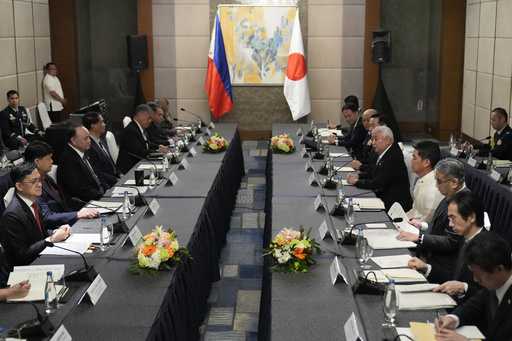MANILA, Philippines – On Monday, Japan and the Philippines reached an agreement to enhance their defense collaborations amid growing concerns regarding China’s assertive actions in the region. This development was highlighted during a meeting between Japanese Defense Minister Gen Nakatani and his Philippine counterpart, Gilberto Teodoro, in Manila, focusing heavily on the situation in the contested South China Sea and East China Sea.
Both nations are treaty partners of the United States and have consistently voiced their opposition to China’s rising assertiveness, particularly in disputed territorial waters. Opening the discussions, Teodoro expressed hope for stronger defense relations with Japan to counter China’s unilateral efforts and broader challenges to the international order.
Following the discussions, Nakatani announced a commitment to bolster operational cooperation through joint exercises and shared military training with multinational partners, as well as enhancing information-sharing protocols. He also mentioned the initiation of talks aimed at establishing mechanisms for safeguarding military information between the two countries.
Last year, the Philippines formalized a pact with the United States that aimed to ensure secure exchange of sensitive military intelligence and technology, helping to facilitate U.S. arms sales to the Philippines. This agreement, known as the General Security of Military Information Agreement, was signed in Manila by then-Defense Secretary Lloyd Austin and Teodoro, at a time when U.S.-Philippines military collaboration was intensifying in response to regional threats, particularly from China.
Nakatani and Teodoro both acknowledged the increasingly severe security landscape and stressed the need for enhanced cooperation as strategic allies to maintain stability in the Indo-Pacific region. Japan has long faced territorial disputes with China over islands in the East China Sea, while confrontations between Chinese and Philippine naval forces have escalated in the South China Sea.
Another key point of their discussions was the expansion of bilateral cooperation, particularly stemming from the recently signed Reciprocal Access Agreement. This agreement facilitates the deployment of Japanese and Philippine forces for joint military exercises on each other’s soil. The Philippine Senate has already ratified this agreement, and its passage through Japan’s legislature would activate it.
This agreement represents Japan’s first military accord with an Asian nation, following similar agreements with Australia in 2022 and Britain in 2023. Japan is working to enhance its defense capabilities, including the establishment of a counterstrike capacity, which deviates from its post-World War II self-defense policy. Additionally, Japan plans to double its defense budget over a five-year period leading up to 2027.
Japan’s militarization efforts may be viewed sensitively by neighboring nations that suffered during its wartime aggression prior to its defeat in World War II. Nonetheless, both Japan and the Philippines are progressively strengthening their defense links, primarily driven by the shared concern of regional threats posed by China.


